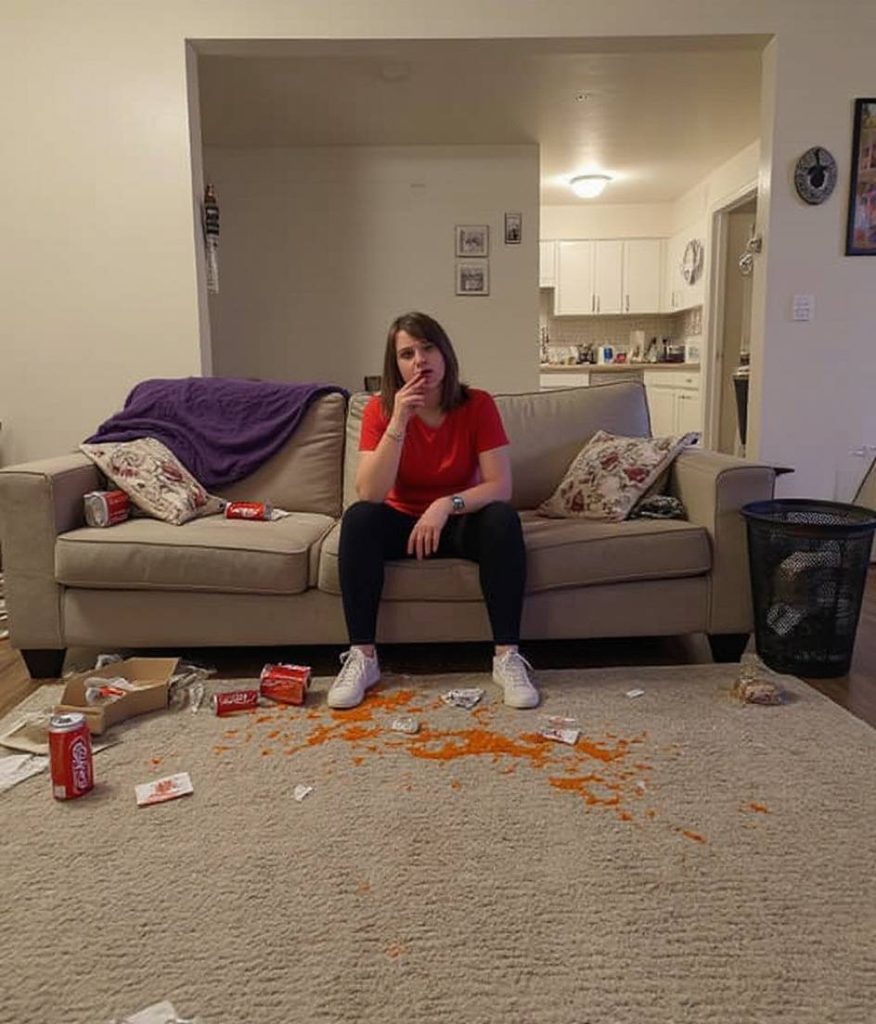Feel like someone is walking on you? I’m Lillian, and I felt like a servant at home for three months. My stepdaughter left trash everywhere and said I was cleaning up. I taught her kindness has boundaries.
Conrad and I constructed a warm house on Maple Street over 10 years, where laughing filled the corridors and Sunday mornings brought pancakes and crossword puzzles.
Miles, my firstborn, was doing well in college. Tessa, 22, Conrad’s previous daughter, crowded around us.
God knows I tried. Heartfelt birthday greetings, spurned girls’ night invitations, and delicate questions about her dreams were shrugged off.
Tessa wasn’t mean. Worse, she was indifferent like faded wallpaper she’d learned to ignore.
However, when she called Conrad that wet Tuesday evening, crying, to come home “just for a while,” my heart softened.
“Of course, sweetheart,” Conrad murmured without looking at me. We’ll always have room for you.”
I smiled and squeezed his hand. What else can I do?
Three days later, Tessa came in designer boots with three suitcases, two tote bags, and a family-sized duffel.
I had furnished our guest room with soothing blues and fresh flowers. She passed me with a small nod and took it.
“This’ll do,” she murmured, dropping her luggage with picture frame-shaking thuds.
Welcome back, honey! I said, lingering in the doorway. I made your favorite casserole for dinner.”
She looked up from her phone. Oh, I ate. Thanks, though.”
My hands shook with rage as I threw out her casserole after a week in the fridge.
Early indications appeared within days. Tessa left a breakfast bowl with curdled milk on the coffee table. Her makeup wipes littered the bathroom sink like sad party confetti.
Walking behind her, I picked up the pieces of her life she dropped.
I held an empty water bottle from between the couch cushions and murmured, “Tessa, sweetie,” one morning. “Can you recycle these?”
Looking up, she blinked slowly and shrugged. “Sure. Whatever.”
But the bottles kept appearing—under the sofa, on windowsills, rolling across the floor like ghost town tumbleweeds.
“She’s adjusting, Lil. When I mentioned it, Conrad shrugged and said, “Give her time.”
Two weeks became a month, and the mess multiplied like bacteria. Amazon boxes stacked at the door—opened, emptied, and abandoned. Small clusters of neglected dishes spread from the kitchen to every surface.
A brown, sticky banana peel was behind a couch cushion one evening, like a cartoon.
“Tessa,” I said. Come here, please.
I felt touched by her impeccable appearance in the entryway. “She’s so like her mother,” Conrad often said.
She stayed put, asking “What’s up?”
I showed the peel. Found this under the couch.”
She looked at it, then me. “Okay?”
“Okay? Tessa, this is unusual.”
“This is a banana peel, Lillian. Chill.”
Just peel. Like her carelessness wasn’t smothering me.
“I’m not trying to be difficult,” I said. “I need help cleaning our home.”
Her sighed cut like glass. “Fine. I’ll try harder.”
Nothing changed. Got worse.
On a promising Sunday, it broke. Kissing my forehead and promising Chinese takeout for dinner, Conrad left for his monthly golf game. The morning was spent deep-cleaning the living room.
I vacuumed, dusted, and polished it as Conrad and I did.
Humming a Miles tune, I picked some fresh herbs from the garden. It was like being myself. I froze when I returned to the living room.
Damaged takeout bags from last night littered the coffee table. Soda can rings on hardwood could discolor. The cream rug I saved months for was covered in vivid orange Cheeto dust.
Tessa sat on my spotless table, scanning her phone like she’d never cleaned up.
Looked up and smiled. “Hi Lillian! Starving. Make those pancakes? The ones from my birthday last year?
“Sorry?”
“Pancakes! I want homemade. Yours are decent.”
I stared at the mess of my morning, her request, and how she perceived me as her maid.
“You know what?” I said. “I ran out of pancake mix. Get takeout.”
That night, beside Conrad’s soothing snores, I decided Tessa could treat me like aid. Even help may quit, she learned.
My strategy began the next morning. Every dish she left stayed. I kept every wrapper, container, and sign of her at bay.
The coffee table was a mess by Tuesday.
“Lillian?” Tessa called from the living room. “Forgot to clean?”
“Oh,” I peeked. “Those aren’t my dishes.”
She blinks. “But you always clean them.”
“Do I?” I tilted my head, confused. Can’t remember agreeing to that.”
Conrad got home to discover Tessa muttering while loading the dishes, a first since moving here.
“What’s up?” he whispered.
“Encouraging independence,” I said.
Instead of pushing, he frowned.
I entered phase two Thursday. Tessa’s room received all her trash—chip bags, Kleenex, rotting fruit.
I scrawled her name neatly in Sharpie on the pillow and said, “Thought you’d want this back! XOXO Lillian.”
She stomped downstairs when she saw her trash arranged like art.
She demanded, “What the hell is this?” brandishing a rotting apple core.
You own that! Wouldn’t throw away something important.”
It’s trash, Lillian!
“Is it? So why leave it under the couch?
Her mouth opened, closed, and opened again like a fish out of water.
This is ridiculous!
“Hmm, maybe,” I answered.
Next Tuesday was the ultimate blow. I got an idea after noticing a week of Tessa’s trash—candy wrappers, banana peels, half-eaten lunches.
On the counter was her work lunchbox. As usual, she grabbed it without looking and left.
I meticulously packed her week’s rubbish like a sad bento box. Moldy core, empty bag, used cosmetic wipe neatly wrapped in corner.
My phone buzzed at 12:30 p.m.
WHAT THE HELL LILLIAN?!
“Garbage in my lunch?”
Everyone at work calls me crazy!
«What’s wrong with you?»
Typed slowly: “Thought you’d want your leftovers. Enjoy your day!
Golden silence followed.
Tessa didn’t slam the door or leave when she arrived. She stood in the foyer, possibly for the first time, examining the house.
Since Conrad worked late, it was only us.
“Lillian?” she called.
From my Sunday crossword with Conrad, I looked up.
“Yes?”
“The living room looks good.”
It was clean, serene, and homey, not a storage unit.
Thanks, I said.
Nodding, she went upstairs. Her faint putting-away sounds were audible.
Next morning, the living room was clean. The dishwasher held her dishes. Her laundry was nicely folded near the steps.
Never before has Tessa appeared apprehensive at the kitchen doorway.
“I cleaned up,” she said.
I noticed. Thank you.”
She took an apple from the counter and left.
“Tessa?” I phoned.
She turned.
“Just ask nicely for pancakes. I never needed more.”
Her expression changed, not to apologize but to hope.
“Okay,” she said. “I’ll recall.”
After the Great Lunchbox Incident of Maple Street two months ago, Tessa and I might not be best friends or share secrets, but we have respect.
Now she cleans up. Please, thank you. She helped me put flowers in the front garden, moaning about dirt beneath her nails.
Last Sunday was our first pancake day in months. She ate four and grinned, saying they were good.
Conrad wondered what spell I cast to transform his daughter from hurricane to human.
I grinned and remarked, “Sometimes people need to see their mess before cleaning it up.”
Learning certain lessons the hard way hits hardest. Sometimes the ones who love to teach them were invisible all along.


